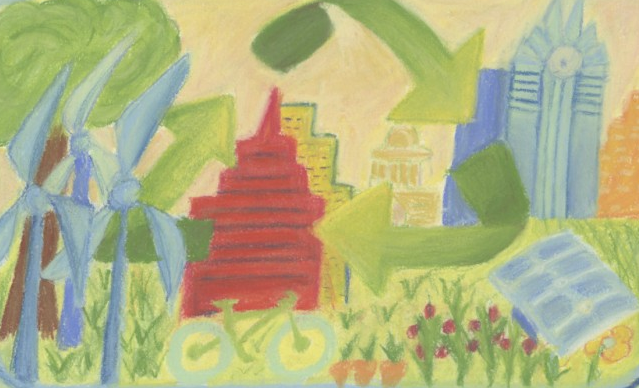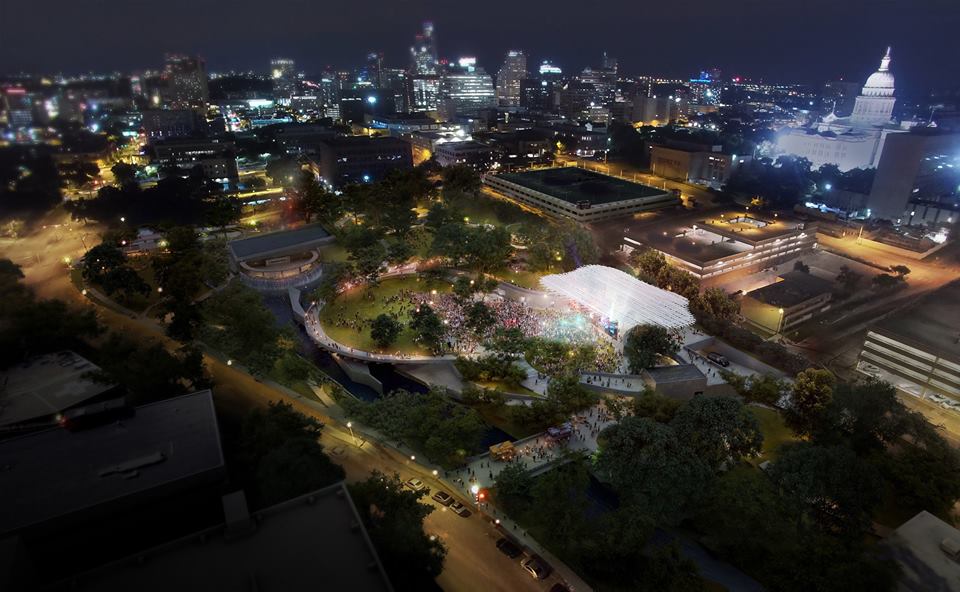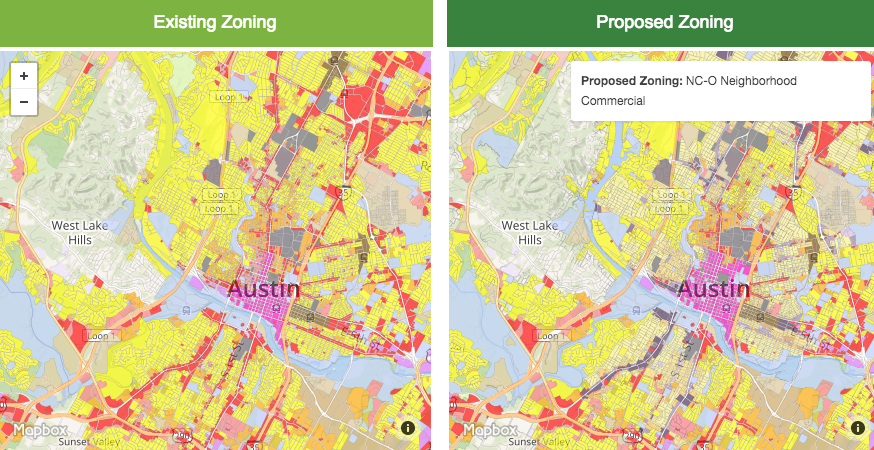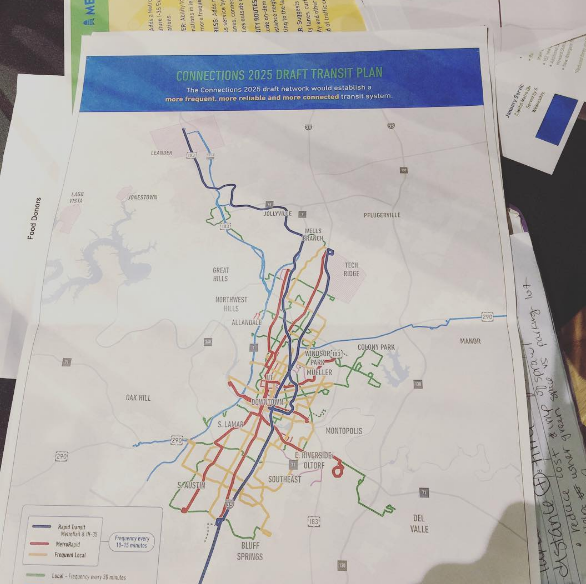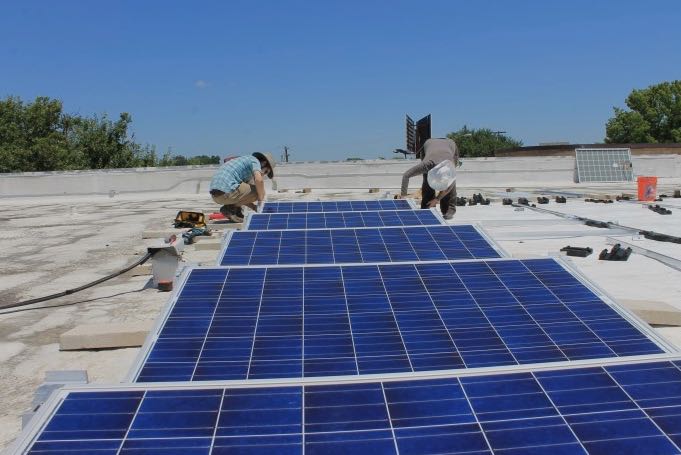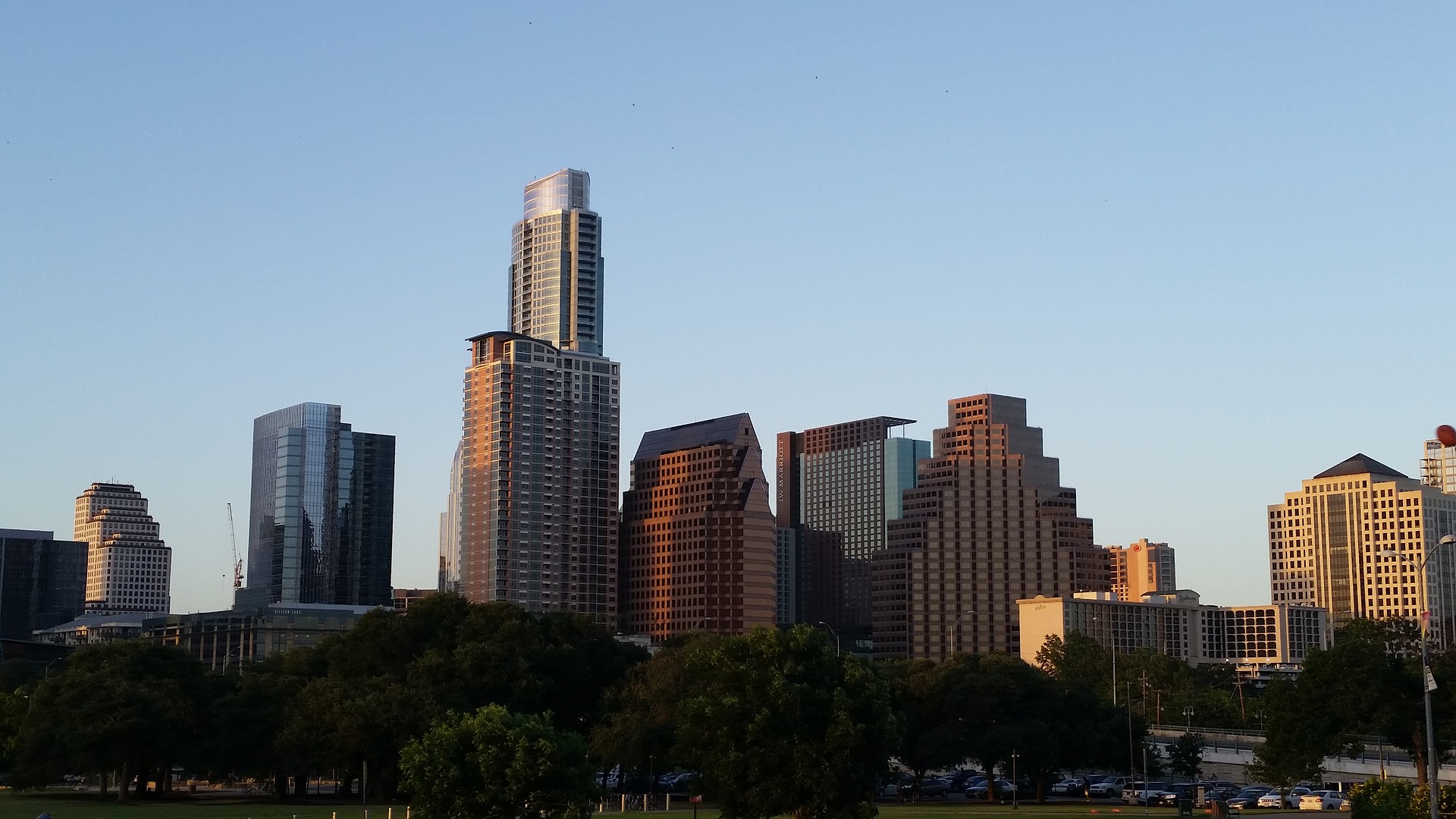2017 was quite a year.
For Austin’s local environmental community, it was one marked by protests, packed City Council meetings, and a renewed effort to become leaders in the global fight against climate change. National events (like the environmental policies of a newly elected President Donald Trump) had an outsized influence on local environmental policies, as leaders scrambled to fill a void left at the national level.
In some ways, 2017 was also a year of growth within the local environmental community, as more organizations began making the conscious decision to become increasingly diverse, inclusive, and intersectional in their approach to environmentalism. This past year saw these organizations not only advocating for strong action on climate, but also for transgender rights, more progressive policing policies, and protections for Texas’ immigrant communities.
Before we start exploring what 2018 has in store for Austin’s environmental community, we thought now would be a good time to reflect on some of these themes and see how they played out in the biggest local news stories of the year. So here it is. Our list (in no particular order) of the biggest eco things to happen in Austin in 2017.
1. President Donald Trump Is Inaugurated… And Austin Marches
The year began with the inauguration of a president, one that in Austin, was met with protest after protest. On inauguration day, the local environmental community joined in with other civil rights and justice organizations to organize the One Resistance march.
“We recognize that communities of color often bear the brunt of environmental racism and a lack of regulation leading to issues such as water scarcity, contamination, negative health impacts, and food shortages.” – One Resistance website
The next day, the Women’s March brought tens of thousands of people to Congress Avenue, holding posters advocating for everything from action on climate change to reproductive rights.
2. $15 million grant awarded to Waterloo Park
In 2017, one lucky park in Austin received the largest single donation to parks and open space in Austin’s history. The Moody Foundation awarded $15 million in February to fund improvements at Waterloo Park on East 12th Street in downtown Austin.
Planned improvements include the construction of an amphitheater and great lawn (that will fit up to 5,000 people), as well as a mile and half of trails, gardens, and play spaces. Waterloo park has largely been closed to the public for the past few years, as construction crews have worked on an intake building for the Waller Creek Tunnel, a major project aimed at reducing flooding in downtown Austin.
The park is expected to be reopened in 2019.
3. Texas Legislature Comes To Town
Our state’s lawmaking body was in session in 2017 (they only meet every other year), making headlines nearly every day of the 140 day session (plus the special session). The hallmark battle of the 85th Legislature was the one between local and state control, as state lawmakers systematically tried to dismantle rules and ordinances passed by city councils throughout Texas. These included everything from local tree protection ordinances, to plastic bag bans, to provisions allowing transgender people to use the bathroom of their choice. In the end, none of these local rules were completely overturned (although some minor changes were made to tree ordinances).
“As I was coming up here from Austin, Texas, tonight, I got to tell you, it’s great to be out of the People’s Republic of Austin. As you leave Austin and start heading north, you start feeling different. Once you cross the Travis County line, it starts smelling different. And you know what that fragrance is? Freedom. It’s the smell of freedom that does not exist in Austin, Texas.” – Texas Governor Greg Abbott, speaking at the Bell County Republican Dinner this summer
Perhaps the biggest blow to local control came with the passage of SB4, the bill that cracked down on “sanctuary cities” in Texas. This bill was vigorously protested by Austin City Council, especially by Austin City Council Member Greg Casar (who was arrested protesting the bill).
4. CodeNEXT draft is released
The biggest local policy debate to rage in 2017 (and beyond) was CodeNEXT, our city’s effort to rewrite its land development code. It’s basically a rule book for the city, explaining what can be built where. CodeNEXT will determine how Austin looks 10, 15, and even 50 years from now. And it will affect everything from affordability, to transportation, to the environment. In other words, it’s a really big deal and because of that, it has inspired some really big arguments.
Ever since the first draft was released in February, Austinites have been debating everything from the merits of densifying our city, to the plague of gentrification, to the struggles of balancing a growing city with the protection of Austin’s historic neighborhoods…And it’s not over yet.
The third draft of CodeNEXT will be released to the public in February and according to the original timeline, City Council will vote on a final draft in April. However, that timeline will likely be delayed (some community groups are even calling for an election on CodeNEXT).
5. Cap Metro Approves The Biggest Bus Changes In Its History
For years, Austin’s public transportation services have been notoriously lacking. Even as the city has grown in size, ridership has been down and costs have gone up. That’s why Capital Metro’s board of directors decided to shake things up in 2017, approving Connections 2025 and with it, a whole host of new changes meant to get more Austinites out of their cars and into buses.
Cap Metro has called Connections 2025 the, “most significant changes to the agency’s bus service in its history.”
Here’s what’s included:
- A more than doubling in the number of high frequency routes (with buses coming every 15 minutes or faster)
- More east/west routes
- Routes will be straighter and better connected to activity centers and denser parts of town for easy and more direct traveling
6. Austin experiences its warmest winter on record
2017 brought Austin its warmest winter on record. More than one out of every four days hit the 80 degree mark and our average temperature was a full degree higher than the previously warmest winter on record (1999 – 2000).
Of course, this warm winter alone isn’t proof of climate change. But, as our State Climatologist John Nielsen-Gammon said to the Austin American-Statesman, this winter is in keeping with a long-term trend of warming throughout Texas since the 1970s.
7. Donald Trump removes the US from the Paris Climate Agreement
Although he had been threatening to do so on the campaign trail, President Donald Trump sent shockwaves throughout the international environmental community in June when he announced that he was pulling the US out of the Paris Climate Agreement. The US is now the only country not participating.
Here in Austin, the news hit hard, since so many Austinites had played a role in advocating for the creation of the Paris Climate Agreement (the world’s first real global accord on climate change) in the first place. Several local politicians and nonprofit leaders had even made the trip to Paris in 2015 to show their support.
However, the shock and anger quickly turned into action, as the city joined the We Are Still In movement and Austin Mayor Steve Adler pledged to continue to honor the Paris Agreement, whether the federal government chose to do so or not. Since then, Adler has traveled all around the globe, promising to make Austin a leader in the global fight against climate change.
“Austin will not stop fighting climate change. Worldwide, cities will lead in achieving climate treaty goals because so much of what’s required happens at the local level. Regardless of what happens around us, we’re still Austin, Texas.” – Austin Mayor Steve Adler

A local artists rendering the Paris Climate Agreement, painted when the agreement was first agreed upon in 2015
8. Austin’s Renewable Energy Goals Are Updated
The first test of Austin’s commitment to leading on climate (after Trump’s decision to withdraw from the Paris Climate Agreement) came almost immediately, with an update to Austin Energy Resource, Generation, and Climate Protection Plan.
Every few years, the city’s Austin Energy Resource, Generation, and Climate Protection Plan is updated. The plan basically serves as a roadmap, determining where Austin will get its energy for the next several years. Will it come from solar, wind, coal, natural gas? That’s what the plan helps to decide.
The 2017 update became a bit contentious within the environmental community as some advocated for adopting a goal of increasing our city’s renewable energy penetration to 65 percent by 2027 and others pushing for 75 percent by 2027. Some activists also began pushing City Council to adopt a goal of making Austin Energy 100 percent carbon free by 2030. Hundreds of Austinites packed City Hall on the day of the hearing to share their opinions on how quickly Austin’s renewable energy transition should be conducted.
“I urge you to please, look at this not just as what is comfortable to do, but what is the most that we can do, the fastest that we can do it. And that’s what leadership is…It is now our job as a community to push our utility to go the next step to get to a carbon-free energy supply, completely carbon-free, and to do it as quickly as possible because there is no time to waste.” – Kaiba White, Energy Policy And Outreach Specialists at Public Citizen Texas, at the hearing
In the end, City Council approved the 65 percent goal, but also asked that Austin Energy conduct a number of studies assessing the feasibility of a 100 percent carbon-free by 2030 goal and an 80 percent renewable energy by 2030 goal.
9. Austin Is Charlottesville
In August, a white nationalists rally in Charlottesville, Virginia which left three people dead, made headlines throughout the country. With many people asking how such a flagrant act of racism could happen in today’s day and age, one local environmentalist joined with nearly a dozen other local justice activists and decided to tackle the question head on, in what would become our most read guest blog post of 2017.
“One of the deadliest forms of denial is assuming that I am not part of the problem. The same, by the way, is true of climate change. There is an anonymous quote- “No raindrop thinks it’s responsible for the flood.”
As with all systemic issues, no one individual can be blamed for institutional racism. But we are, each of us, accountable for participating in it, whether we are aware of it or not. Making the choice to actually be accountable leaves you with the kind of power that does not come from privilege and does not require anyone else having less.” – Janis Bookout, in Austin Is Charlottesville
10. Zebra Mussels are found in Lake Travis… and then in Lake Austin
The fears of local biologists came true in 2017 when invasive zebra mussels were discovered in Lake Travis… and then in Lake Austin. These rapidly producing species had already been wreaking havoc in other bodies of water throughout Texas, clogging public-water intakes, damaging boats and motors, and leaving treacherously sharp shells along beaches and shorelines.
Texas Parks and Wildlife officials are currently monitoring the situation at both lakes and are telling boaters to please remember the cardinal rule – clean, drain, and dry – in order to prevent the zebra mussels from spreading even further.
11. Hurricane Harvey slams into the Gulf Coast
Texas suffered one of its worst environmental disasters in recent memory when Hurricane Harvey slammed into the Gulf Coast in August. The storm left Houston underwater, dumped a whopping 47 inches on some parts of the state in just a few days, and cost dozens of Texans their lives. The city of Beaumont lost access to its entire water supply.
But the damage didn’t stop there.
Environmental disaster upon environmental disaster soon followed, with the explosion of a chemical plant in Crosby, Texas (making first responders sick), the release of harmful chemicals (from nearby refineries), and the production of tons of debris and waste.
The hurricane also raised alarm bells about the future consequences of climate change on the both the health and economic well-being of Texans.
“Hurricanes are a naturally-occurring hazard for anyone who lives or works along the Gulf Coast, in the Caribbean, or up the Atlantic coast of North America. We care about a changing climate because it exacerbates so many of the natural hazards we already face today – like hurricanes.” – Katharine Hayhoe, Texas State Climate Scientist
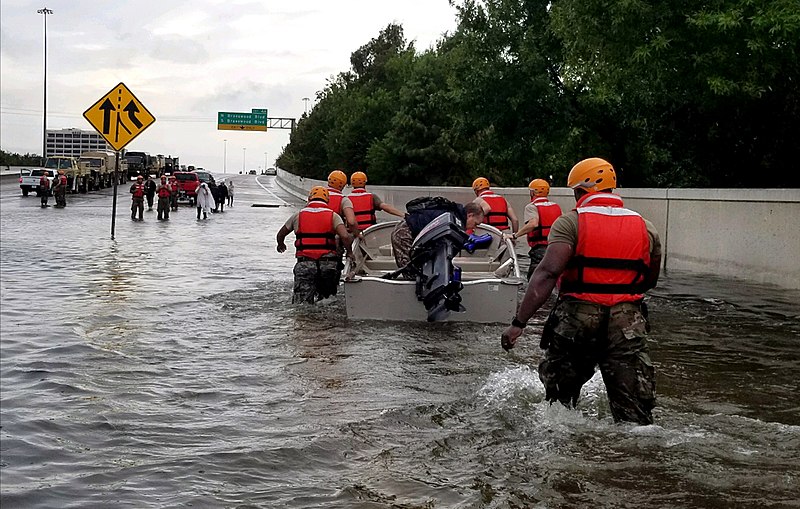
Soldiers with the Texas Army National Guard move through flooded Houston streets as floodwaters from Hurricane Harvey continue to rise, Monday, August 28, 2017. Photo via Wikimedia Commons, U.S. Army photo by 1st Lt. Zachary West
12. New Central Library opens
After years of waiting and construction delays, the new $125 million Austin Central Library finally opened to the public with great fanfare in October. And it appears to be worth the wait, because since then, an average of 8,000 Austinites have been visiting the library each weekday (that number rises to 15,000 on Saturdays and Sundays). That’s over 10 times the visitation at the former Faulk Central Library.
Not only has the new Central Library become a beloved cultural hub, but it has also served as a shining example of local green building initiatives. Aiming for a LEED Platinum designation (that’s the highest one) from the US Green Building Council, the library is decked from basement to roof in eco-friendly features. These include a massive rainwater collection system (which is three stories tall and can hold 360,000 gallons of water), a solar array, and a rooftop garden.
A post shared by Austin EcoNetwork (@austineconetwork) on
13. Austin City Council Rejects The Police Contract
For the first time ever, Austin City Council voted to reject a proposed police contract in 2017. Their decision was driven largely by an outpouring of activists who called on City Council to demand more accountability and less spending from our city’s police department. In keeping with a trend that grew throughout 2017, some local environmental organizations joined in to support the civil rights and justice advocates leading the charge on the movement for police reform.
A post shared by Austin Sierra Club (@sierraclubatx) on



